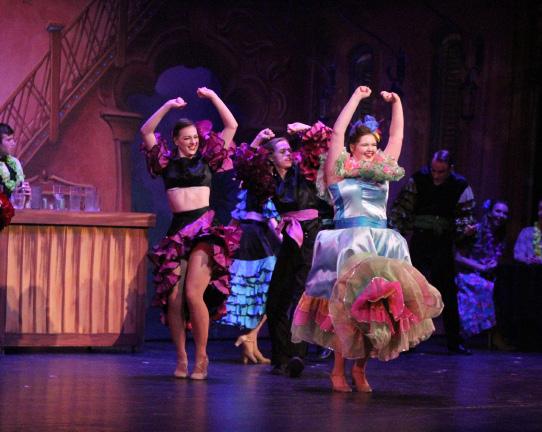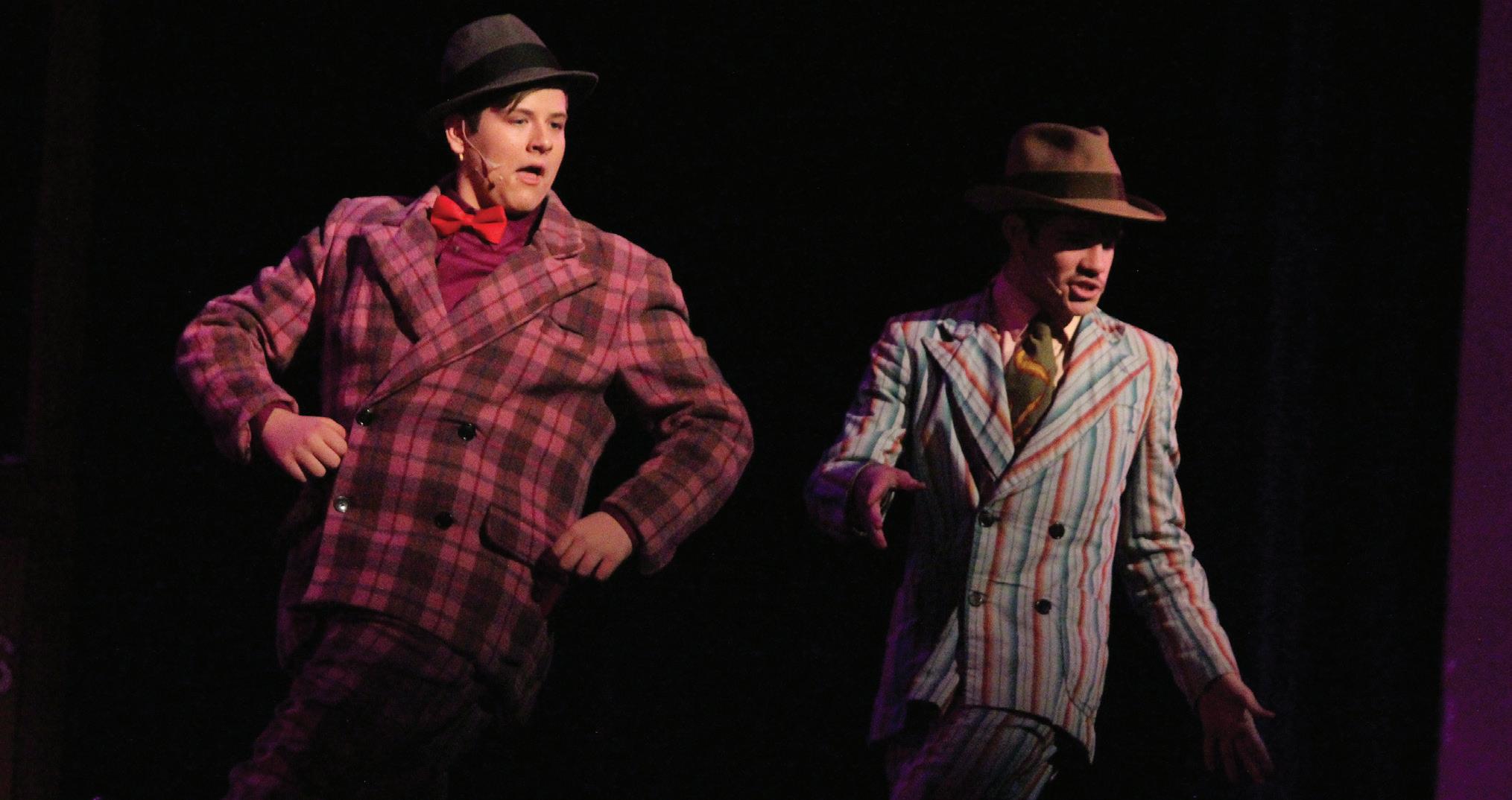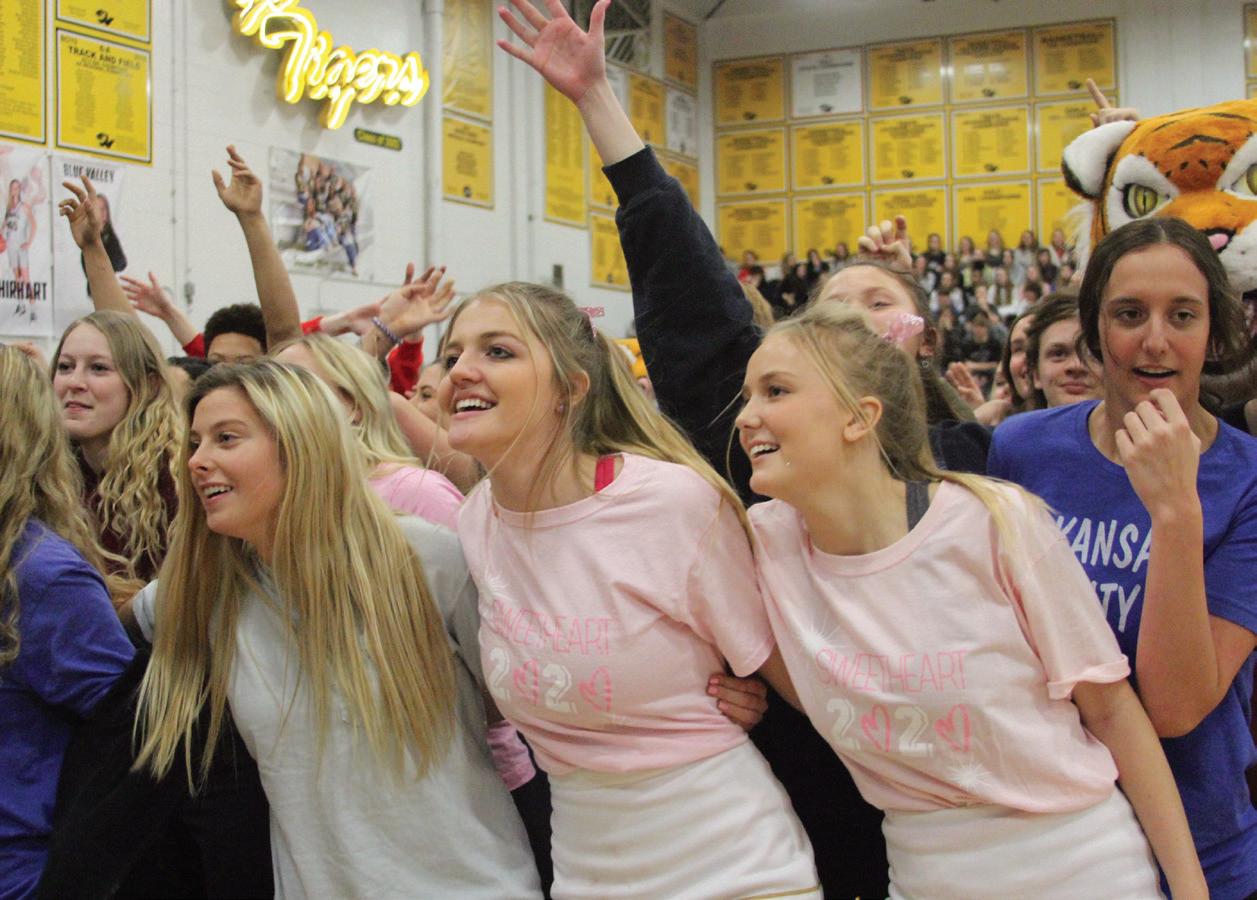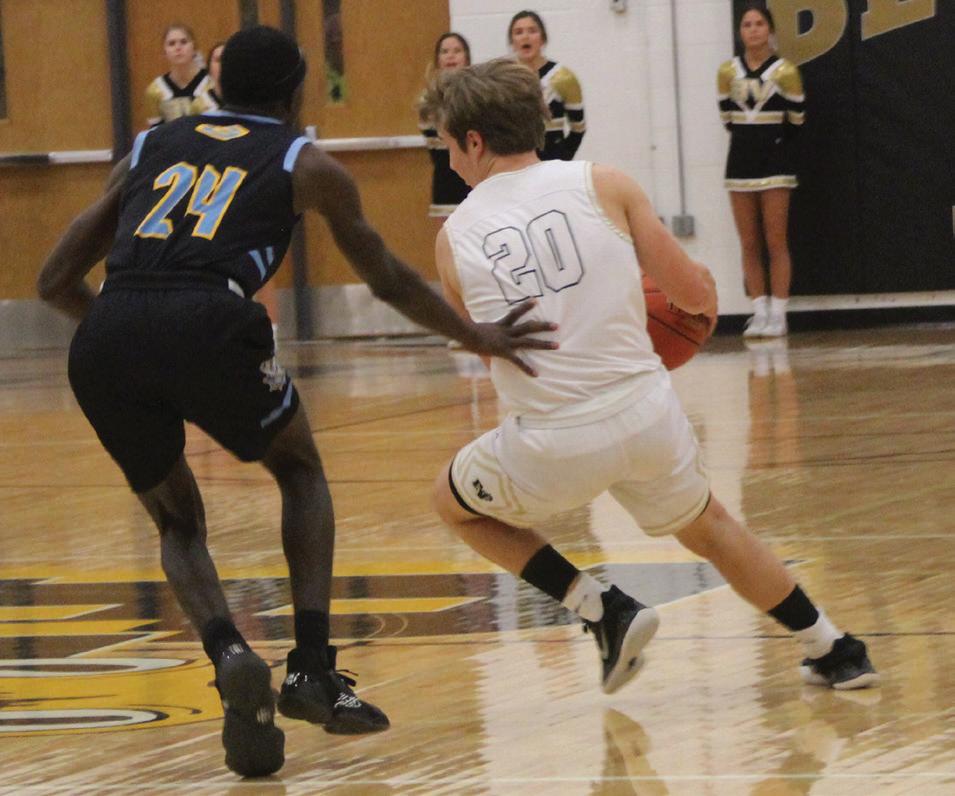
26 minute read
Back to the ‘20s
Let’s party like Gatsby
tymber moody & mia rice staff writers
Advertisement
Within the month of February, our school hosts its annual Sweetheart Dance. Many students look forward to this event and all of the unique traditions that come from it.
One tradition is that girls ask boys to the dance instead of the traditional way of boys asking girls.
Another exciting feature of this year’s sweetheart was that the students had the opportunity to pick the event’s theme.
Student Council members decided to have students choose which theme they wanted via a questionnaire. The options for this year’s theme were the Roaring ‘20s and Disney, among others. While quarreling between many possible themes for the night, the Roaring ‘20s ultimately won the vote.
“We narrowed it down so that the school can actually choose,” junior class president Piper Puccetti said. “Some
Sweetheart 2020
times people are upset with the themes that we choose, and so this time [they had] the chance to choose.”
When deciding the themes of the dances, the officers and reps in StuCo for each class came up with a few themes and presented them to the executive officers. After that, they moved onto one of their Friday meetings and put them up on a board for the entire StuCo group to vote on.
Once the narrowed them down, they decided on preparations and ideas of what they would potentially do for that particular theme. Then they voted for a final time.
“I’ve always recommended Great Gatsby as a theme idea because I think the decorations are super exciting,” Puccetti said. “It’s going to be a really fun day, and it’ll get people excited to attend.”
Puccetti is on the decorating committee this year and hopes to incorporate the famous Gatsby movie into decorations.
Elements of the Great Gatsby fantasy are the biggest hope for the
decoration committee. This all comes from the book’s lavish 1920s setting, Puccetti said.
“I really want to make it like in The Great Gatsby movie with the big party scene,” she said. “It would be so awesome to incorporate a lot of that into our decorations, have loud music and have people [feel] like they’re back in the ‘20s.”
Decorating for dances can be hard work, and the committee welcomed volunteers. The Roaring ‘20s sets back to the 1920s and all of the pivotal changes that decade brought. Mostly known for flappers and parties.
“We prepare decorations, probably like a month out from when sweetheart is,” she said. “Then we actually decorate for Sweetheart the morning of just like we do Homecoming.”
Setting up all morning makes for a hectic day, but on account of the whole school, it’s always worth it.
“The ‘20s is a popular theme,” Puccetti said. “Our school is determined to make it memorable with fresh inspiration.”
liya patel staff writer
Since the introduction of the smartphone in 2007, the debate over its benefits has been a heated topic of discussion.
Its place in the classroom, as well as its effects on teen’s mental health, became the deciding factors for Blue Valley’s administration to enforce the removal of phone-usage in the classroom setting.
During the welcome-back meeting at the beginning of the new semester, principal Scott Bacon described the hundreds of benefits that phone removal would have, not only on the school’s overall performance, but on the mental well-being of the students. Because phones have become such a vital part of societies’ social, mental and emotional survival, the idea of restricting phones in high school seems like the ultimate nightmare.
When the idea of phone removal was introduced, freshman Zane Burton, along with the majority of students at the school, were not pleased.
“I think phones are important for us, especially in the society we live in,” Burton said.
Although students might see the removal of phones as a punch to the gut, several staff members seem to have an opposite perspective. Business teachers Kathy Peres and Madi Plankers used their experiences as teachers who have taught prior to the extreme use of phones to explain why phone restrictions in the classroom could be more beneficial than most would think.
“Phones are an important part of students’ social lives, but mental health is such a big deal now,” Plankers said. “If this is a way we could improve the current issues revolving around mental illness, I am all for it.” When it comes to teenagers in today’s society, mental health and well-being seems to be most at risk. The stress and anxiety that comes from viewing stories and snaps about the latest party that some missed out on or rumors that are spread via pictures and texts have been shown to weigh on students’ minds at an unhealthy amount.
“If students can have a few hours out of their day where they don’t have to worry about what’s going on through the screens, I think they would be much better off,” Peres said.
The phone usage policy in the classrooms of blue valley will be analyzed at the end of the year to determine its effectiveness.
Pro phones or not, it is safe to say the future of phones at school will continue to be up in the air. Do you agree with the new phone policy? 87.2% of responses out of 166 voted ‘no’
Q
123
Subject: Text Message: Pro Phone or No Phone? New policy receives mixed reviews
W E R
A S D
Z X C T Y U I
F G H
V B J
N O P
K L
M
space return
Tiger
| WORDS & DESIGN BYCLAIRE POWELL Tidbits
John Oldroyd, 12; and Ben Samuelson, 9




Madeline Friesen, 12 Beckett Hampp, 12


Guys & Dolls
This year the BV choir department produced the show Guys & Dolls with freshman Ben samuelson cast as Nicely-Nicely.
“Before I got the role I was nervous,” Samuelson said. “I thought the casting might have seniority to do with it.”
After getting the role of the gambler, Samuelson said he was much more relaxed.
“I’ve just loved doing the musical,” Samuelson said. “All the people in it are just so fun.”
After doing the high school production shows, Samuelson has noticed the different atmosphere compare to middle school.
“I’m going be honest, I didn’t think I was gonna be as tired as I am every day after musical,” he said.
Despite the tireding nights, Samuelson said he has learned a lot thanks to Guys & Dolls.
“It’s making do things I don’t usually do,” Samuelson said. “It’s also great to just get to know all these people in high school.”
Dance Team
Jamie van Loben Sels, ELA teacher


James Euston, 10
| PHOTOS BY CLAIRE POWELL & MACEY FRANKO


Seniors
Sweetheart
During the Sweetheart assembly dance, the teacher’s wowed their students with their Tiktok inspired dance routine. ELA teacher and cheer coach Jamie van Loben Sels was one of those dancers.
“[We teachers] saw all of our kids doing it all the time,” van Loben Sels said. “We thought it would be fun if we surprised [our students].”
Contrary to her original beliefs, van Loben Sels said the dances were difficult.
“It was actually really hard learning it, but it was fun,” she said. This being her first year here, van Loben Sels said the BV environment has been more than welcoming.
“This is the family that took me in right under their wing,” van Louben Sels said. “The kids and overall district is great.”
Dylan Wipperman, 12

| PHOTOS BY CLAIRE MIDDLETON
Aiden Shaw, 10

Boys Basketball
The boys basketball team won its game Jan. 31 against Olathe West. They were able to outlast the owls with a score of 75 to 54.
They played on Tuesday, Feb. 4 at Blue Valley West and will face off again next Tuesday, Feb. 11 against Blue Valley North.
Donut Day
Every year the school’s repertory theatre department goes to a convention in Wichita, Kansas to learn more about theatre, and the improv team, Fifth Wall, competes for State.
This year Fifth Wall won first place. Senior improver Sam Murphy had emotions running high, not just because of winning state but also gaining popularity while in Wichita. “There’s an anonymous app called Jodel that is used at the convention, and a joke was made on there by a few of my fellow classmates,” Murphy said. “It bloomed into something that I can only describe as madness, but basically, I’m a celebrity.”
Thanks to his quick fame on Jodel, many fans came to watch him and the rest of the improv team perform for finals, which according to Murphy, helped lead them to a win.
“It was a great moment — it’s something I’ve been looking forward to since I was born,” Murphy said. “It kind of peaked my life.” Halley Eastham, 11 Joey Compton, 10

| PHOTOS BY CLAIRE POWELL
Let Your Pride Shine
GSA hosts talent show, aims to gain recognition
From a tiny and crowded Spanish classroom to an open, secluded area, the Gay-Straight Alliance club welcomes in members of the LGBT community and allies alike. The Leaders of the GSA are trying to draw in new members by hosting a talent show in April.
“[We’ll be selling] tickets, and we’ve been talking about doing a bake sale,” co-president senior Madilyn Veach said. ”We [are donating to] Glisten. It focuses on student youth LGBT, which is very good for high schoolers. We [decided to pick] a local [cause] rather than a bigger organization.” All proceeds will be put towards the cause; however, the club is also hoping to use the show as recognition for the GSA. “The talent show is a fun thing for us to produce and get more well-known because [we aren’t] a very well-known club,” president senior Brooke Rupp said. “It’s a place for people in our school to show their talents because [some aren’t] involved in choir or theater.”
The club is accepting every applicant that shows any dedication to the show, no matter the talent they choose to audition with. Along with the expected singing and dancing acts, GSA is looking forward to showcasing new and unique talents.
Outside of the talent show, GSA meets every other Monday during Tiger Paws to discuss a variety of topics within the LGBT community.
Since the club has gotten much smaller over the past few years, students are closer due to various group activities and discussions. The club leaders hope to achieve this bond with a larger group of students in the near future.
“I’d really love to be able to get a good blend of people into the club,” Rupp said. “[During] one of the few meetings I [went] to my freshman year, they did a lot of small group discussion, but no one knew each other and no one was really close, so discussions didn’t get anywhere even though they had amazing topics.”
Veatch said the open and accepting atmosphere at the meetings drive home the goal everyone within the GSA strives to achieve: “to spread love, acceptance, and to give people a space where they feel comfortable to accept themselves.”
| DESIGN & WORDS BY HARRISON MELTON & STEPHANIE KONTOPANOS
Student Explores Ancestral History
Winning essay earns junior trip to Washington DC
gabriela ruiz & brynn friesen staff writers
“When I was younger, I was always told to wait until I was older to hear all of the stories. Now that I’m older, the stories are getting harder to tell.” Junior Jonah Kahn drew inspiration from his own experiences and his knowledge of the history of Judaism for an essay he submitted to his synagogue.
“I wrote about how sometimes I hear people make jokes at school [and] why I think being Jewish is important and how that affects my life,” Kahn said.
Kahn’s essay clearly left a notable impression on the application reviewers.
As a reward, Kahn joined an exclusive group of students selected to go to Washington, D.C. There, he toured the United States Holocaust Memorial Museum.
“They have both a temporary and permanent exhibit,” Kahn said. “The temporary exhibit was really cool. We got really lucky because it was about what America did during the Holocaust. As an American, I want to know what was happening during that time and what our country did to stop what was going on.”
According to Kahn, his visit to the renowned museum was a harrowing experience filled with emotion.
As poignant as Kahn recalls the museum being overall, he found one display particularly impactful and eye-opening.
Kahn acknowledges he has faced some challenges throughout his life growing up in a predominantly Christian community. “Sometimes I wish I was surrounded more by people who are like me who understand the religion more,” he said. “You get school off for Christmas and all of those really important [Christian] holidays, [while] I have to miss school [for Jewish holidays.]”
Overall, Kahn thinks it is important for today’s generation to hold onto the stories of the past, especially as the Holocaust becomes a more distant memory.
students sell unique shoes on instagram
maddy kang & frannie lamberti co-editor in chief & staff writer
Reselling shoes and clothes has been made easy with apps like Instagram and PayPal. Two students have been invested in reselling on social media. Their accounts aren’t just your regular closet accounts trying to get rid of old clothes — instead, they sell expensive and rare items. George Perkins, a sophomore who has had his account since eighth grade, is into reselling. His account, followed by almost 2k
people

| Perkins
is @boostedrelease. “Me and my neighbor were sitting on my driveway one day talking about making an account,” Perkins said. “We just randomly thought of that name.”
Perkins has sold over 700 items ranging from Nike and Adidas shoes and Supreme clothing. Prices differ on how rare they are and on how expensive they were to buy.
“Depending on the item, I try to make a 20 percent margin on each thing I buy,” Perkins said.
Buying from other resellers or straight from the company releasing it itself is where Perkins gets his products. “[A reseller will] ship it to me through USPS, and I use PayPal to pay them,” Perkins said. “Then, I post it on my Instagram page and try to sell through there.” Perkins enjoys finding things that aren’t sold to the public yet or things that are cool to him. Even
though Perkins favorite brands for clothing and shoes are Nike and Supreme,
he has a special favorite item. “I have a signed Travis [Scott] picture,” Perkins said. “I’ve owned a few of his shoes.”
Sophomore Jake vonSeldeneck also has a knack for reselling shoes on his Instagram account
called @jocokicks; vonSeldeneck started selling in September of 2017. “[My friends and I] always liked sneakers and figured out that there’s money to be made, so I started to resell,” vonSeldeneck said.
The shoe account has 2.6k followers on his Instagram reselling account and sold 170 pairs of shoes in 2019.
“Right now [reselling] is just a way to make money — instead of having a real job,” vonSeldeneck said. “It’s not necessarily like going to work because it’s on my phone. I’ll be at school messaging people if they’re interested in anything, so I make sales all the time.”
Even though vonSeldeneck ran into some difficulties he hit $30,000 in sales.
“There are people that will waste your time,” vonSeldeneck said. “They’ll just ghost you if they just change their mind or something.”
Selling lots of different kinds of shoes, vonSeldeneck said he’s sold a lot of Nike and Adidas shoes — but mostly Yeezys and Ultra Boosts. His successes so far have also influenced what he would like to pursue in the future.
“[I’ve] been able to make money without having to actually go and work a real job — it’s a lot easier,” vonSeldeneck said. “I definitely think I’ll go to college and get a degree in business.” Being involved in the business of reselling has helped vonSeldeneck and Perkins figure out their future careers.
“I’ve been able to connect with a lot more people that I would have never known without reselling,” Perkins said, “I’ve been able to figure out what I want to do for a career path through reselling.”

SafeSpace Student creates app for crisis hotlines
claire powell staff writer
Imagine an app that has all the hotlines you may need for a mental health crisis. Anytime time you were in need to talk to someone, you could just open the app and have an ample amount of hotlines to call or text. That was senior Samuel DeZube’s goal when making the app SafeSpace.
“There’s a mental health crisis going on. Everyone’s going through stuff like anxiety or depression,” DeZube said. “There’s too many people who don’t know what to do [or] reach out to. Through research I figured out that there’s no one out there who’s made an app that has all these hotlines— calling and texting, in one place.” Through CAPS, DeZube made a SafeSpace prototype.
After finishing the prototype, DeZube was able to submit it for the Congressional App Challenge.
“I had no idea what I was doing — I have programming experience, but I’ve never made an app before,” DeZube said. “I was watching videos trying to figure out how this all worked. Having to learn stuff on your own with absolutely no guidance was definitely stressful at first, but it all ended up [being] worth it.”
After winning the congressional app challenge, DeZube started improving his app with a company called Net Smart.
DeZube said he didn’t want to make the app just for teenagers, which is why there is a Veteran’s Crisis Textline available. “A lot of people were like, ‘Oh, why don’t you just do teen stuff?,’ but I tried to get the widest reach,” Dezube said. “I don’t want them to open the app and be like, ‘There’s nothing on here I can call.’” Despite the frustrating nights of work and deadlines, DeZube said it was worth it.
“The most rewarding part was I could l do something with my passion, which is programming technology in the field of mental health,” DeZube said. “[That] hit me personally throughout high school and I’m sure everyone’s been touched by it. I just think too many lives are lost for reasons that they shouldn’t be. Even if I end up saving one life, that’s one life saved.” “Even if I end up saving one life, that’s one saved.” “I think of it like the epi pen of mental health.”

Crisis Lines Available on SafeSpace
National Suicide Lifeline
Sexual Assualt Hotline
Teen Abuse Hotline
Substance Abuse Hotline
National Crisis Textline
Veteran’s Crisis Textline
on-duty oppression on-duty oppression
teens experience harassment within the work place
in the news in the news
It was reported that 38 Michigan businesses were in violation of wage and child labor laws on Dec. 12, 2019. This discovery was made through investigations conducted by the U.S. Department of Labor’s Wage and Hour Division.
A total of 167 minors that were found working in violation of the Fair Labor Standards Act. Of these minors, 132 of them were working outside of legal working hours for minors, and the remaining 35 minors were employed within hazardous conditions or positions for their age. Ten minors from the ages of 15 to 17 were performing hazardous occupations for minors, such as using heavy machinery, operating trash compactors and making time-sensitive food deliveries. More than 30 minors, ages 14 and 15, were found working jobs prohibited for the age group. The remaining more than 100 workers were employed outside allowed work hours.
The businesses owed a sum of $94,501 in civil money penalties for violating child labor laws, with only $92,194 being paid. According to the Kansas Department of Labor, “Under the Fair Labor Standards Act, children under 16 can work between 7 a.m. and 7 p.m.” From June 1 through Labor Day, evening hours are extended to 9 p.m. as an exception.
Minors “under 16 can work up to three hours on a school day, 18 hours in a school week, 8 hours on a non-school day, 40 hours on a non-school week,” according to the Kansas Department of Labor.
written by: claire powell, spencer norman, chloe browning
Lilly Curtright After around 40 years of law experience through the Johnson County District Attorney‘s Office, the Office of the Kansas Attorney General and representing clients in employment and business litigation attorney Rick Guinn gave insight into the laws surrounding child labor, for which they don’t see many cases.
“Unless it’s a class action lawsuit where there’s a large number of employees involved, the extent of monetary damages that exists for somebody that’s likely many times working minimum wage doesn’t make it financially feasible for attorneys to take those kinds of cases,” Guinn said.
Guinn talked about how many of the cases he sees involving teens and their workplace involve inappropriate behavior of other workers towards the teens.
“[If] they have been touched or harassed inappropriately, and they want that activity to stop and the employer doesn’t do anything about it, then the employer becomes liable,” Guinn said.
Guinn believes another reason they don’t see many of these cases is that employers know they can face serious charges if caught in violation of child labor laws or other workplace laws. He also spoke about the abuse of the hours teens can work. By Kansas law teens are only allowed to work between the hours of 7 a.m. to 7 p.m. during the school year. “[Breaking of this law seems to be] more prevalent, not tremendously prevalent, but more prevalent in the restaurant industry and the food service industry,” Guinn said.
Luckily for teen employees, there are ways to report mistreatment or unfair work environments.
The Kansas Department of Labor has a website that provides for an employee to lodge a complaint. You fill out the questionnaire that they have on their website and then the Department of Labor will look into your complaint.
“You have to make a decision — do I want to go to the manager and complain because sometimes that ends up with you being ostracized?” Guinn said. “But if it’s bad enough, you should go and complain.”
Lilly Curtright expert s opinion expert s opinion
do you have a job? 70 70 30 %
%no
yes 6 6 % of students work over 8 hour shifts * b a s e d o n a p o l l o f 1 6 6 b v h s s t u d e n t s
Like many teenagers, junior Lilly Curtright was in need for some extra cash. At the age of 15, she decided to pick up a busser job at a restaurant in Martin City, and for her nine
months of working there, Curtright faced several mistreatments, such as the length of her shifts.
According to the U.S. Department of Labor, a 15-year-old can only work till 7 p.m. on school nights and 9 p.m. on weekends. Although these laws are in place, many workplaces overlook them.
“I would get off work around 11:30 at night,” Curtright said. “I was aware of the law but I knew that my boss did not care.” In addition to working late, Curtright said the environment itself was extremely hostile.
“It was a very stressful job — the waitresses and owners would always get mad for little things,” She said. “If you were already going to do something, [the owner] would tell you to do it faster [or] yell at you for stuff that other people did. It was stressing me out to the point where I would go home and cry.”
Curtright’s boss demanded odd tasks, which only amplified the negative experience.
“She didn’t want anyone who wasn’t eating at the restaurant to park in our parking lot, so you would have to go up to strangers and tell them they can’t park there,” Curtright said. “We would have to stand in the cold for around an hour, even if it was winter.”
Although Curtright found the treatment to be unfair she did like one thing and that was the pay.
Curtright was making Missouri minimum wage, $8.60, plus the tip out at the end of the night where she’d earn $40 to $100. Despite this, Curtright couldn’t stand feeling unsafe in the work environment.
Curtright quit after spending nine months bussing and she has now gotten a new job at Tanner’s. After working in a new restaurant, she truly saw how badly she was treated previously. Curtright felt it was important that she was safe and happy where she was working.
“In the end, the money wasn’t worth the stress,” she said. “It definitely wasn’t worth being treated that way.”
Husam Younes HUsam Younes
On a hot day in August, with the start of school right around the corner, junior Husam Younes went to the pool with friends — he later found himself and his fellow teenage co-workers crammed in a Target office, told they would all soon be laid off.
After being denied to work at the Starbucks at Target, Younes was offered to work as a cashier for the store. Wanting to quickly find a place to work, he accepted the position, later realizing why the spot was opened in the first place.
“The people I worked with were nice but the management was pretty bad,” Younes said. “If you tried to take off work for a certain day, they would always make you feel guilty about it.”
Being a part of theater, Younes would have to rerarrange his shifts––however, Target seemed to ignore his requests. “They don’t care about your schedule — they make you follow their schedule,” Younes said. “If you went to go talk to [management, they] wouldn’t fix it.”
When Younes would come to his shifts, he said the Target managers would ask if he could work afterward as well.
“Almost every shift they’d [ask] ‘Can you stay an hour or two longer?’” Younes said. “I would always hesitate, but I’d say yes. I wanted to show that I cared about my work.”
Though Younes and other past Target workers thought the work environment was unfair, they were paid higher than the minimum hourly wage of $7.25.
“I was paid $14.50 an hour,” Younes said. “I think they pay that much to cover up the fact that the management is terrible.”
As the end summer began to roll around, Target started to hire more workers, most of whom were out of high school or had already retired from a past.
“What happened was we were getting overstaffed, and one day some of us were called in an office,” Younes said. “They basically were telling us how they’re going to [start] firing I think teenagers that work are still thought of as little kids and places of work will just take advantage of them.
us. Most of the people that were [going to get] fired were teenagers.”
Almost immediately, Younes, who had been working at Target for 10 months, was angry — most of his co-workers feeling similar emotions.
“We were mad because we worked there for so long. I felt like I was actually putting in a lot of work and when [I was assigned my shifts] I would always try my best to show up,” Younes said. Knowing that they were going to lay me off like that didn’t make sense. At that moment, most of us got up and said we quit now, and then [we] left the store.”
Looking back, Younes realized the extent of his unfair treatment — and not just him, but other high school students in work environments.
“I think teenagers that work are still thought of as little kids and places of work will just take advantage of them,” Younes said. “I’ve texted some of [my old coworkers,] and they felt the same way. They’re happy with their new jobs.” Younes said is important for teenagers to have work experience, but that shouldn’t mean they are driven to the ground because of it.
“I encourage people to go get a job but make sure you don’t overwork yourself,” he said. “Communicate with your managers, and stick to your schedule because that job needs you more than you need them.”



